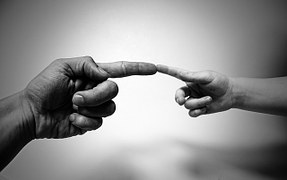I don’t know the purpose of the sunrise. As I lie on the beach looking out over the water, I can’t say anything about indubitable truths or universal structures of knowledge. I only know to look for the foundations of meaning in the lived experience of the world.
The sun coming up over the seascape hints at something beyond ourselves. Everything I know, everything I see, everything I experience, is ringed by that minuscule bubble of horizon. Yet the horizon points past itself to what lies outside of awareness, outside of direct perception, and to a world of anticipation, hope, and expectation. That is the world in which we live – one part perception, another part assumption and desire.
Perception, Assumption, Desire
You walk into a coffee shop or party and are thrilled and nervous at seeing the woman that you’ve long desired but have been too shy to approach. Her back is too you. You recognize her friends, her hair flowing down about her back. With a dry mouth and lump in the throat, you find the courage to approach and tap her on the shoulder. You are surprised and disappointed when someone unknown turns.
Our views of things are always inherently incomplete. Philosopher Maurice Merleau-Ponty explains that every aspect of a thing is only an invitation to perceive beyond it. The dress. The heels. A familiar hairstyle. Some common friends. All pointed toward an expectation of the woman you wanted to see. The “horizon” of our perception delimits our perspective. It is anticipation that leads us out beyond the boundaries. So our experience of the world is more than our perception. Husserl explains everything that “is”, every “actuality”, also involves it potentialities. Everything I see refers to something anticipated, but not yet perceived.
Of course, horizons are not limited to the visual plane. When I was lying on the beach the salt breeze carried with it the sweetness of lemon blossoms and a hint of the sour rot of fish. There are smells beyond smells. A gull called to me over the gentle hush of surf. There are sounds beyond sounds. I tasted salt from the sea and felt the sun warming my skin. Everything we see, hear, smell, feel and taste is delimited by its own horizon.
Cultural and Psychosocial Horizons
 There are also cultural and psychosocial horizons. Every loadstar by which we set our bearings is hung within the limits of awareness. We have beliefs about the world and what we want it to be. We hold tightly to our notions of justice or fairness. We want to believe the stories our parents told us as children, the fairy tales, the sacred texts. We believe that goodness matters, that humility and integrity have a “cash-value” after all, and that with persistence and grit and kindness, dreams do come true.
There are also cultural and psychosocial horizons. Every loadstar by which we set our bearings is hung within the limits of awareness. We have beliefs about the world and what we want it to be. We hold tightly to our notions of justice or fairness. We want to believe the stories our parents told us as children, the fairy tales, the sacred texts. We believe that goodness matters, that humility and integrity have a “cash-value” after all, and that with persistence and grit and kindness, dreams do come true.
Yet we do our jobs with diligence and integrity and are unnoticed. The people we thought were there for us let us down more often than we’d like. We expect that the ladies in big houses don’t need the refuge of battered women’s shelters. Except sometimes they do. Ivy League graduates do not become alcoholics. Except sometimes they do. Children who are deprived of all companionship and love are fated to spend the rest of their lives struggling to pick up the pieces, except when they are the strongest among us, except when they illuminate the very best of the human spirit and act as the pillars upon which true community rests.
We have beliefs about who we ourselves are too. Yet sometimes we push through a challenge or hardship and discover that we are better than we first thought we were. Or the beliefs we hold about others are challenged when someone close to us betrays our trust, or lets us down, because they are more human than we wanted to let them be.
Life sometimes has its own plan. It happens with its own logic, its own pace. The universe has no regard for what we wanted or had come to expect. You defined your life in terms of activity and strength and then are nearly crippled by chronic knee pain in early adulthood. Or you invested in real estate to pay for college for the kids, only to have the bottom drop out of the housing market. Or one day you discover a silent tumor whispering to you in Latin, “Memento mori,” (remember you will die), and realize that the appointments and holidays written on the calendar might never come. We are Alice falling down the rabbit hole.
It is as if one of the mischievous gods from another era or culture had come down to visit and played some trick. We can shake our head at the injustice, eyes turned down. We can lift our fist to the sky and scream. Or soaked in the new facts and challenges we can open our arms wide, dash with our hair and joyously test our soul through the next hardship or adventure life hands us. Absurdity is never out of place. Nothing is ironic or paradoxical. It is simply a matter of expecting something different than what lay beyond the horizon.
Why does any of this matter?
Certainly we see in Husserl the first steps toward modern studies in affective forecasting. We draw on clues from experience, perception, and memory and try to predict what might make us happy. Social psychologists examine how the unseen influences our lives. Priests and prophets do too.
But when we become aware of the horizons that encircle us, it is an invitation to humility and awe, and opens us to infinite new ways of interacting with the world.
Humility
By bracketing off our anticipation of who we are, or our desire of who we want to be, from our direct perception, we sometimes see how we fall short of our image of ourselves.
I pride myself on my understanding and patience. And yet at times I catch myself being short with my teenager or self-righteous with my wife. I know the backstory, my purported justifications, even if they don’t. I have read the exclusions written into the contract. Therefore, I can footnote my self-image and keep it generally intact.
It is these moments of defensible hypocrisy that act as corrective lenses with which to see each other more clearly. We may never know the reasons that others fall short of the most strict expression of their espoused values. But they too have reasons, explanations, and human justifications. Hypocrisy is not an astringent with which to burn others (or ourselves). Rather, it is the salve that clears the gum from our eyes. It allows us recognize the incompleteness, imperfection, and beauty of being human. All of us are all just trying to figure things out and deserve a pass when we don’t get it quite right.
Awe
Stripping down the nature of experience also opens us up to awe. Awe is one of the world’s great collateral promises to us. The universe does not care whether we dawdle at the mall or are enraptured by a sudden realization of the possible worlds beyond the horizon. That we evolve toward awe says nothing about why the sunrise over the water is so beautiful.
But once we become consciously aware of the infinite worlds that exist just beyond our known horizons, we suddenly become smaller. Rather than diminishing us, a realization of what the horizon suggests folds us into a greater whole. We become aware that we too are part of the miraculous infinite.
By recognizing the marvelous beyond the bounds of direct perception, our own problems, cares, and concerns seem manageable. In tracking over 800 people for more than 70 years George Vaillant points out that the hardships and trials that so concerned us in youth and middle age seem small and relatively unimportant in the grand scheme of our lives. Yes, we have to attend to them in the moment. But like a child with a skinned knee, we are pulled in close to our mother’s breast and know that everything is going to be all right. So horizons are temporal too.
Infinite Ways of Interacting
These are only a few conceivable responses to life. Just as the possibilities beyond the horizon are endless, so too are our potential ways of interacting with the world. The challenge is to embrace the sweet density and obscurity of life, recognize the meaning in the rawness of experience, and acknowledge that through reflection we may never catch up.
Maybe I am biased by my hope. What I do know is there are multiple credible interpretations of the world. Life is a game, a story, a tragedy, a comedy, a mission, an art, an adventure, a disease, desire, nirvana, selflessness, honor, learning, suffering, an investment, and relationships. At times life simply is. Whether you believe we only get one shot, or that how we live makes a difference in the afterlife or future lives, what we decide now matters. If we have to play the game, we might as well play it beautifully, see what we can learn, try to make things better and easier for one another and enjoy the ride as much as we can.
©2017 John A. Doyle, Jr, All Rights Reserved.
References & Further Reading
A version of this article first appeared on Positive Psychology News Daily.
Beyer, Christian (2013). Edmund Husserl. In Edward N. Zalta (Ed.) The Stanford Encyclopedia of Philosophy (Summer 2013 Edition).
Flynn, Bernard (2011). Maurice Merleau-Ponty. In Edward N. Zalta (Ed.), The Stanford Encyclopedia of Philosophy (Fall 2011 Edition),
Gilbert, D. (2007). Stumbling on Happiness. New York: Vintage.
Haidt, J. (2006). The Happiness Hypothesis: Finding Modern Truth in Ancient Wisdom. New York: Basic Books.
James, William (1907/1995). Pragmatism (Philosophical Classics). Dover.
Keltner, D. (2009). Born to Be Good: The Science of a Meaningful Life. New York: W. W. Norton & Co.
Vaillant, G. (2003). Aging Well: Surprising Guideposts to a Happier Life from the Landmark Harvard Study of Adult Development. New York: Little Brown.








Very thoughtful piece, Sean. The “potentialities” presented by many things we encounter are sources of anxiety, fear, and dread. You appear to suggest that we can move beyond those concerns by embracing the complexity of life and properly contextualizing them. Another approach might be to reject the mind’s instinct to seek out potentialities in favor of present-mindedness. I’m not sure that’s at odds with the approach you advocate, but would be interested to hear your thoughts (especially if I’m uncharitably interpreting your views).
Thanks Wes. Maybe I emphasized the dread to much! That is only one possible result. All sorts of responses can flow from our anticipation. And while I agree that being mindfully aware can be another useful approach. I don’t think we can be, or would even want to be, totally in the moment all the time without anticipation. As such, I think the two approaches compliment one another. If we can be in the moment more often, and embrace whatever life throws at us, we will find harmony and play.
Pingback: Rediscovering a Zest for Life – Sean Doyle
Sean, You probably are biased, but how could we not be? Disappointment indeed is often ” simply a matter of expecting something different than what lay beyond the horizon”. Assuming we want to avoid the road of depression and despair, and that efforts to pin down our “notions” as eternally true always fail, the choice of approach is of which bias to select. If we all must have a bias, I like yours.
Thanks Corey. And I do feel like we really don’t have many other choices but to throw ourselves in fully and embrace life: the good, the bad, the wonderfully uncomfortable.